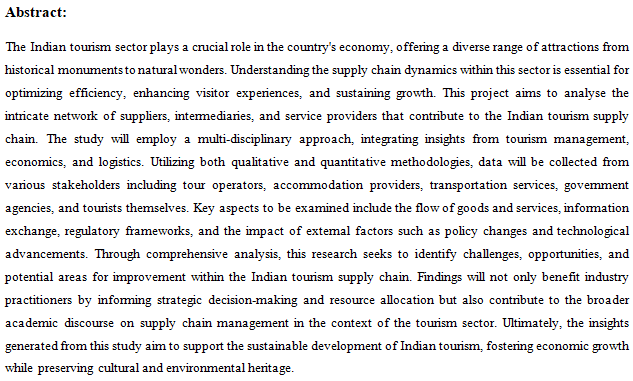Analysing the Supply Chain Dynamics in Indian Tourism
DOI:
https://doi.org/10.5281/zenodo.17677954Keywords:
indian tourism, supply chain dynamics, digital transformation, infrastructure development, regulatory frameworks, tourism efficiency, seasonality challenges, logistical inefficiencies, technology integrationAbstract
The Indian tourism sector plays a crucial role in the country's economy, offering a diverse range of attractions from historical monuments to natural wonders. Understanding the supply chain dynamics within this sector is essential for optimizing efficiency, enhancing visitor experiences, and sustaining growth. This project aims to analyse the intricate network of suppliers, intermediaries, and service providers that contribute to the Indian tourism supply chain. The study will employ a multi-disciplinary approach, integrating insights from tourism management, economics, and logistics. Utilizing both qualitative and quantitative methodologies, data will be collected from various stakeholders including tour operators, accommodation providers, transportation services, government agencies, and tourists themselves. Key aspects to be examined include the flow of goods and services, information exchange, regulatory frameworks, and the impact of external factors such as policy changes and technological advancements. Through comprehensive analysis, this research seeks to identify challenges, opportunities, and potential areas for improvement within the Indian tourism supply chain. Findings will not only benefit industry practitioners by informing strategic decision-making and resource allocation but also contribute to the broader academic discourse on supply chain management in the context of the tourism sector. Ultimately, the insights generated from this study aim to support the sustainable development of Indian tourism, fostering economic growth while preserving cultural and environmental heritage.
Downloads
References
Christopher, M. (2016). Logistics & supply chain management. Pearson.
Cooper, M. C., Lambert, D. M., & Pagh, J. D. (1997). Supply chain management: More than a new name for logistics. The International Journal of Logistics Management.
Page, S. J. (2019). Transport and tourism: Global perspectives. Pearson.
India Brand Equity Foundation (IBEF). (2022). Tourism & hospitality industry in India.
KPMG. (2018). Indian hospitality industry: Performance review and investment outlook.
Jauhar, V. (2009). Managing sustainability in tourism. Oxford University Press.
Scarpato, R. (2002). Gastronomy as a tourist product: The perspective of gastronomy studies.
Gossling, S., Garrod, B., Aall, C., Hille, J., & Peeters, P. (2009). Food management in tourism: Reducing tourism’s carbon 'Food print'.

Published
How to Cite
Issue
Section
License
Copyright (c) 2025 Gauri Ajit Deshmukh, Nainesh Mutha

This work is licensed under a Creative Commons Attribution 4.0 International License.
Research Articles in 'Management Journal for Advanced Research' are Open Access articles published under the Creative Commons CC BY License Creative Commons Attribution 4.0 International License http://creativecommons.org/licenses/by/4.0/. This license allows you to share – copy and redistribute the material in any medium or format. Adapt – remix, transform, and build upon the material for any purpose, even commercially.









